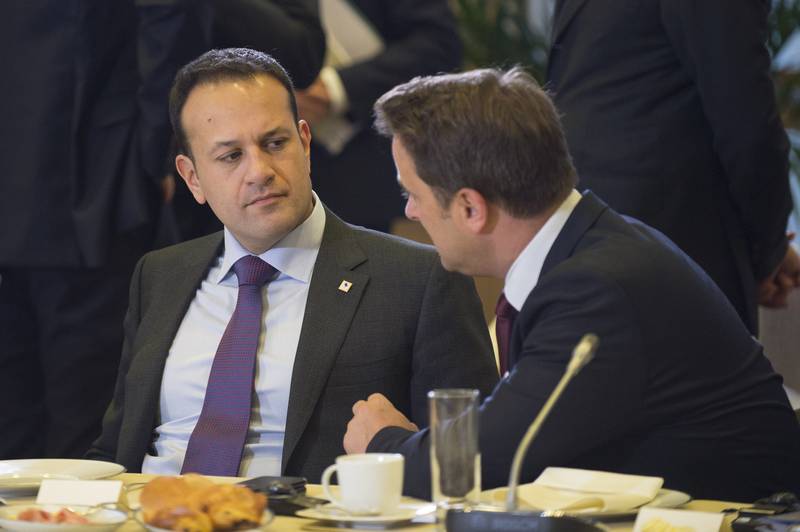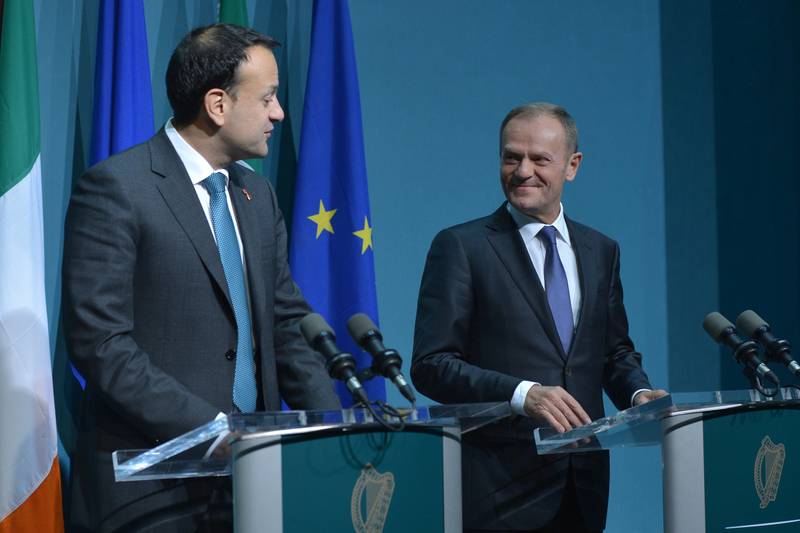A Counterbalance of EU's Macronisation Has Emerged, or a Celtic Tiger II
Adelina Marini, December 12, 2017
 The prestigious European Charlemagne Prize for 2018 was awarded to French President Emmanuel Macron last week. This is the oldest prize awarded for merit for European unification. It is a recognition of Mr Macron's vision "of a new Europe and of the re-establishment of the European project, of a new European sovereignty and a close, restructured cooperation between peoples and nations", said the press release of the Board of Directors of the Society for the Conferring of the International Charlemagne Prize of Aachen. The award recognises Emmanuel Macron's commitment to Europe, and his decisive stance against all forms of nationalism and isolationism. Among the prize winners are Pope Francis, Angela Merkel, Donald Tusk, Jean-Claude Juncker and other prominent European politicians from the present and the past of the EU.
The prestigious European Charlemagne Prize for 2018 was awarded to French President Emmanuel Macron last week. This is the oldest prize awarded for merit for European unification. It is a recognition of Mr Macron's vision "of a new Europe and of the re-establishment of the European project, of a new European sovereignty and a close, restructured cooperation between peoples and nations", said the press release of the Board of Directors of the Society for the Conferring of the International Charlemagne Prize of Aachen. The award recognises Emmanuel Macron's commitment to Europe, and his decisive stance against all forms of nationalism and isolationism. Among the prize winners are Pope Francis, Angela Merkel, Donald Tusk, Jean-Claude Juncker and other prominent European politicians from the present and the past of the EU.
But while Emmanuel Macron was winning sympathies and made the front pages of European and international newspapers, the next possible candidate for the prize was growing under his shadow - Irish Prime Minister Leo Varadkar. Both are extremely young - Emanuel Macron is 39 years old and Leo Varadkar is 38. The 1.90 metres tall Leo Varadkar is the son of an Indian doctor and an Irish nurse. Just like Emmanuel Macron, Leo Varadkar shook the world with his personal life, but in another aspect and with a much stronger charge. Emmanuel Macron became known for being 26 years younger than his wife. But such things are normal for the French public who is accustomed to all the strangeness of their leaders. Leo Varadkar caused a far greater tsunami in Ireland - a small, highly conservative Catholic country. Besides being a prime minister with immigrant background, Leo Varadkar announced in 2015 that he was gay. With him, the representatives of the gay community in the European Council have become two (the other being Luxembourg Prime Minister Xavier Bettel).
Leo Varadkar took up the post of prime minister not a month after Emmanuel Macron, but somehow, completely undeservedly remained in his shadow. The reason is that, although a prominent representative of the new generation of global leaders, Leo Varadkar comes from a small Ireland, while France rightfully bears the title of Europe's engine, regardless of the fact that in recent years and even decades, it hasn't been able to rise to the level of this position, and has been lagging behind the other European engine - Germany - economically and politically. Another reason is that Leo Varadkar comes from a "mainstream" party - the right-liberal Fine Gael (EPP) - that is part of the establishment, whereas Emmanuel Macron has positioned himself as an anti-establishment player who won the election with a brand new political movement, "En Marche!", created nearly a year before the election victory.
But while Emmanuel Macron still has to prove himself, Leo Varadkar is already accumulating important points that could bring him the Charlemagne prize. The former physician made a serious statement that he would turn Ireland for a second time into a Celtic tiger, but this time in a much wider sense - not just as an economic champion, but as a European leader who is capable of replacing Britain after her departure as a way to keep the balance between the agenda of Germany and France and a more liberally oriented and open Europe. Balance, which seemed under significant risk after the election of Emmanuel Macron and his debut at the June EU summit in Brussels when he declared soft protectionism.
 This summit, marked by the restoration of the Franco-German engine, was a debut for Leo Varadkar too. Even then he left an impression as a person who should be carefully observed. And if the Irish national briefings stopped being of interest to the Brussels media guild after Ireland's exit from its rescue program, that could very soon change. In June, Leo Varadkar won his first battle, and against Emmanuel Macron at that. At the insistence of Ireland and with the support of the other liberal states (mainly in the northern part of the EU), changes were made to the text of the conclusions on trade. He then said that everything should be done to avoid protection of European interests from becoming a Trojan horse of protectionism.
This summit, marked by the restoration of the Franco-German engine, was a debut for Leo Varadkar too. Even then he left an impression as a person who should be carefully observed. And if the Irish national briefings stopped being of interest to the Brussels media guild after Ireland's exit from its rescue program, that could very soon change. In June, Leo Varadkar won his first battle, and against Emmanuel Macron at that. At the insistence of Ireland and with the support of the other liberal states (mainly in the northern part of the EU), changes were made to the text of the conclusions on trade. He then said that everything should be done to avoid protection of European interests from becoming a Trojan horse of protectionism.
"It's fair to say that the pro-enterprise, pro-trade, globalist, small trading countries had the text changed and change in their favour", Leo Varadkar said at the end of the June European Council. He then started to orient more towards tighter relations with the countries of Scandinavia, the Benelux and the Baltic countries because, as he explained, these are countries with similar views on attracting foreign direct investment and investment from outside. Because of his views, Leo Varadkar was invited to attend a working breakfast of the Scandinavian and Baltic states during the autumn EU summit.
After the end of the summer European Council, he announced that due to Britain leaving, Ireland should start building new coalitions in Europe. He sees many similarities not only with the northern states, but also with Malta and Cyprus, and is already working on getting closer with these countries. But if nothing else, it is precisely Brexit that can bring Leo Varadkar's recognition as a European of the year. Last week was key in the Brexit negotiations, as the end of the first phase of the two-stage negotiation was finally agreed and the biggest winner of the first phase is definitely Ireland. Under the leadership of Leo Varadkar, Ireland set an ultimatum on its big close neighbour that until it had written assurances that there would be no hard border between the Republic of Ireland and Northern Ireland, Britain would not be able to move into phase two of the negotiations that concern future relations of the United Kingdom with the EU.
The ultimatum of Ireland, with a population of 4.7 million, would have in itself meant nothing for the 70-million United Kingdom, was it not for the 450-million European Union backing Ireland. As European Council President Donald Tusk (Poland, EPP) said in Dublin 10 days ago, the Irish request is an EU request. Thanks to this strong European pressure led by Ireland, the deadline set by Donald Tusk for Theresa May to make significant progress on the first phase by December 4 was met last week. And a deal was made at the last possible moment. Leo Varadkar's role is indisputable. He will certainly remain a leading figure in the second phase as well, as trade negotiations are key to Ireland and the EU as a whole.
However, Leo Varadkar's ambition does not stop there. The Irish prime minister, who is also the minister for defence, has made another major move by pushing his military-neutral state into the Permanent Structured Cooperation in Defence, known as PESCO, which is the foundation of the common European defence. In June, Mr Varadkar said that Ireland remains neutral, but in October he announced he would leave the door open for potential membership. Right in the peak of the Brexit week (4-8 December) Dublin made the announcement just before the meeting of EU foreign ministers on December 11, when PESCO was formally established by 25 countries.
 In October, Leo Varadkar said he was enthusiastic about PESCO and wanted Ireland to be a part of it, but couldn't do anything that could compromise the Irish military neutrality. He said however, that Ireland cannot be neutral in terms of human trafficking, terrorism, drug trafficking and cybercrime, and will participate in such projects as well as peacekeeping and support for new democracies and states to build. This suggests that, with Leo Varadkar at the helm, Ireland has great ambitions to replace Britain in the field of foreign policy as well.
In October, Leo Varadkar said he was enthusiastic about PESCO and wanted Ireland to be a part of it, but couldn't do anything that could compromise the Irish military neutrality. He said however, that Ireland cannot be neutral in terms of human trafficking, terrorism, drug trafficking and cybercrime, and will participate in such projects as well as peacekeeping and support for new democracies and states to build. This suggests that, with Leo Varadkar at the helm, Ireland has great ambitions to replace Britain in the field of foreign policy as well.
His opinion of Emmanuel Macron is that the French president is a truly convinced European, for whom the presidential elections were his first victory. In October, he was completely frank in front of journalists, saying that not all of Macron's ideas were in his taste but he respected them. However, he underlined that he preferred the community approach. "[...] the best way to achieve progress is to use the community method, to have it led by the institutions, by president Juncker and president Tusk, not by any member state. So, it's not that Macron's ideas are not welcome. It's just that they aren't any more welcome or any more important than those put forward by any other prime minister or president".
If you are still not convinced that Leo Varadkar is the alternative leader of Europe at the end of the Merkel era and the beginning of the Macron era, watch his weekly video wrap-ups on Twitter. The tall Dubliner has a specific facial expression - he seems to be constantly smiling and undoubtedly has the potential to tilt Europe's balance for the benefit of small and open states. He has already done it in a deeply conservative environment. So it can also be done in the EU as well.